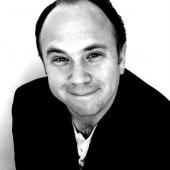When I assess the theatrical career I was never supposed to have, I'm not sure if I think I’m winning or losing. When it comes down to the day job versus performance opportunities, the day job now takes precedence. On the other hand, regardless of what the rules say, I don’t feel like I’m losing—which I suspect is the benefit of playing a game largely of my own design.
My job now is not standing in place of my passion for theater, but is
rather a result of it.
When I moved to Minneapolis in 1992, I had already dismissed the idea of a theatrical career. I had a fair amount of college and community experience, but no degree, no credits, and no theater education beyond high school. I did like performing though, so to placate that impulse (not to mention as a way to meet people in a new town) I started taking improv classes at
Stevie Ray’s and
Dudley Riggs' Brave New Workshop. I had long identified myself as a "funny person," so improv proved a good match for me.
And, for a few years, that was my world. My day jobs were what I did to pay bills, but in the evening, improv classes became performances. The more involved I became with comedy theater in the Twin Cities, the more it became a priority for me and the more I began to consider myself something starting to resemble an artist.
Oh, who am I kidding? I began to consider myself a Master. It was clear to me the mistakes that were being made that kept this Art from being the wallet-busting, mega-success it deserved to be. If only more money was put into marketing, and if only opportunities were available to showcase local talent, audiences would finally see comedy as the vast natural resource it truly was.
In other words, if only I were in charge, this could be so perfect.
Four years after being convinced that I could have no theater career whatsoever, I teamed up with business manager Anjila Kozel to open the Fool's Tree Theater, named for the William Blake quote, "The fool sees not the same tree the wise man sees." With the help of a small business loan, we opened in the Calhoun Building near the corner of Lake and Lyndale. Our mission was to present high-quality comedy in every conceivable style of performance.
Merrily floating along
What had once been a waterbed store was converted into a store-front theater and coffee shop. It was not a large space, but it was ours.
Our weekly lineup included Friday and Saturday night shows written and performed by an in-house cast. It was mostly sketch comedy (but sometimes a full-length script). Thursday nights were smaller-scale, more experimental shows, often genre-related as I was rabid fan of comic books, sci-fi, gaming, and all things geek-related. Sunday nights were showcases for local troupes, like The Bad Mamma Jammas, True North, and The Scrimshaw Brothers
The Friday and Saturday shows slowly built a decent regular audience. A couple productions still stand out in my memory:
The Prisoners of Warp was a mind-bending trip through the looking glass disguised as a sketch show, and
Mars, Planet of Men was a rip-roaring 50's sci-fi cheese-fest. And the other programming fared much better than I anticipated. The Thursday night shows, things like
The Geek Show and
Dead White Guys found enthusiastic geek audiences. Showcasing outside artists fared very well, and was certainly the smartest thing about the theater from a personal standpoint, as it built a community of talent I would later benefit from knowing.
Near the end of the theater's life there was also a hugely successful staging of
Reservoir Dogs, which, of course, was completely out of synch with everything else the theater had ever produced. But as many theater owners will tell you, money is awesome.
The Fool's Tree closed after about a year. For all our hard work and talents, neither Anjila nor I were ready for such an overwhelming challenge. We made a lot of rookie mistakes. We wasted money trying to chase down a marketing strategy that we never really had. We did not have a pool of existing audience members when we opened. We assumed the press would naturally be wowed by the shocking news of a new small theater company forming in the Twin Cities. They were not particularly wowed.
Afterward, I had to make the theatrical equivalent of the "walk of shame": the getting of the temp job—in this case scanning legal documents into digital form. It was a soul-sucking vocation of relentless repetition in deepest, darkest Bloomington. I still did some performing, particularly with the Scrimshaw Brothers. I started doing the
Minnesota Fringe Festival, and I found more opportunities to present genre-based theater. But there was again no hope of a career.
A second chance
When I turned 30, I took stock of my situation—I wanted a full time career in comedy. There was a theater in the city that offered exactly that. I needed to join the cast of the Brave New Workshop. I had auditioned for them before, but I was now at a point where I truly was an experienced sketch comedy and improv performer. Plus, I was driven. I auditioned, and, nine months later, while serving as an understudy, I made my first appearance. I made a good impression, and several other main stage shows followed.
From there, I became a full-time theater artist. For a handful of years, I managed to pull it off—acting, writing, producing, teaching, etc. I also discovered more acting opportunities in traditional theater settings. I produced more of my own work, particularly at the Fringe.
But, eventually, the pace of this work slowed down. I chose to fill the gap working part-time at
Mill City Museum, trying to keep enough flexibility to justify to myself that I was legitimately pursuing a career.
But soon, the time came to swallow that bitter pill. I needed a full time job again.
The fantasy job
And this is where the story becomes odd.
Fantasy Flight Games produces top-notch genre-based board games, card games, and role-playing games that are sold all over the world. When I asked some friends who worked there about opportunities, I discovered the company was undergoing a period of growth. And, after a life in the theater, I was surprised at how qualified I was for a job.
For one thing, I had written an essay about improvisational theater published in
Second Person: Role-Playing and Story in Games and Playable Media, a collection of writings about interactive fiction.
I also had years of experience crafting narratives, and perhaps more importantly, writing to meet deadlines. I was contracted for a few specific projects, including
Aye, Dark Overlord a story-telling card game in which goblins make funny excuses to their evil master explaining why they, yet again, screwed up his nefarious plan. They liked what I did, and I moved quickly to part-time employee, then to full time.
Since then I have worked on
Middle Earth Quest, The Pegasus Expansion for
Battlestar Galactica: the Board Game, as well as a couple expansions for
Arkham Horror, among others.
Now a professional game-maker, performing provides only a
very small contribution to my yearly income. As galling as it may be to admit after sacrificing so much blood, sweat, tears, money, stability, sleep, and general well-being, the answer to the question of whether I’m winning or losing the performing arts game is, "Sorry. You played well, but you are not a theater professional."
On the other hand, I have a pattern of working only on projects that interest me, a policy I am blissfully still able to indulge to this day. And, my performance work continues to expand to wider and wider audiences. (I was for instance, recently a guest at the
Lovecraft Film Festival.)
My day job flexes all the same muscles and satisfies all the same impulses as creating stories on stage does. This is where my theatrical career has taken me. I would not say that I'm done playing, but for the moment, I am proud and delighted over what I have achieved through losing.




